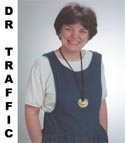Spring 2000
New Sensibilities Always Vie With Old Habits
By Pat Ford
Pew Center

Before she got her electronic database, Diane Whitaker used to hang out in a lot of gas stations. They were one place she could find commuters to comment on stories about the region’s highways. Now, she hits a few keys on her computer and sources come tumbling out– without those nasty exhaust fumes.
Whitaker is the alter ego of “Dr. Traffic,” one of the Charlotte Observer’s most popular Sunday features. Readers send her questions ranging from “When will the new stretch of Colony Road open?” to “Why don’t drivers practice high-beam courtesy?”
Whitaker can answer about three letters a week in her column but she estimates that she receives at least three times that many. Traffic being a major issue in the Charlotte area, she also gets a lot of phone calls and e-mails in her role as transportation beat reporter. Whitaker says she tries to refer those readers she can’t answer in print to the agency or office that can help them.
But 29 years of reporting experience has taught her not to waste a contact. And new technology has made it possible to retrieve every contact with the speed that a reporter on deadline needs.
“Before, I had my little black book with personal notations in the margins. But the names meant nothing — these were just average drivers. The subject was important but it was hard to find later when you needed it,” says Whitaker.
Then, about a year and a half ago, just as Dr. Traffic was getting started and the volume of phone calls and mail was climbing, Whitaker got an electronic database program. She found she could enter commuters’ concerns in the space marked “organization” and then easily find them later.
Whitaker now has a database of hundreds of ordinary commuters organized by the route they travel and the opinions they have.
“Stories are always better when you quote someone besides officials,” says Whitaker. “The best sources are the people who are out there driving in that mess. They’re your little foot soldiers.”
So now, whether it’s a story about speed bumps, rude drivers, bicycle paths, carpools, child safety seats, blind pedestrians or virtually any major road in the Charlotte area, Whitaker can get the view from the driver’s seat.
Take, for instance, the day an editor came in from a frustrating commute on I-77, fuming about how useless the overhead electronic message boards are because they are so seldom used and ordered up a story about it.
Whitaker called up her database and looked for sources listed under I-77. There were about 20 drivers who’d called in about the road and three had actually complained about the message boards. They were in her I-77 file under a “message board” sub-category.
She called them and one called back in time for deadline. “The bigger your database of folks, the better your odds of getting a response,” says Whitaker, adding, “I don’t know how else I’d ever have found someone for that narrow a topic.”
“It’s a blueprint that any editor would love to photocopy and hand out,” says Whitaker’s editor, Mike Gordon. “She’s made such a difference in how we cover transportation around here. She’s made it very driver- and commuter-based.”
As a result, Gordon says, North Carolina highway officials have confided to other reporters that Whitaker breaks stories even the officials, themselves, didn’t know about.
Gordon says Whitaker has built a following, despite the fact that she tends to be shy and retiring — flatly refusing the paper’s request that she go on radio and TV as Dr. Traffic. “She has a reputation across the region not because she sought it out but because she’s so darn good and writes stories that matter to people,” says Gordon.
Readers sometimes contact her in response to an item in her column — for instance, she recently wrote that she was looking for people with high-mileage vehicles and got half a dozen replies. She decided to write a story about the man with 439,000 miles on his truck.
Other readers contact her simply with what’s on their mind. In one recent week, she got two letters and a phone call from people talking about litter on the highways. She says she knew it must be time to write a story about litter and with her correspondents neatly filed in her database, she already has a head start. And more letters, phone calls and e-mails on the subject are likely to come in.
As Whitaker says, “It sure beats hanging out in gas stations.”
